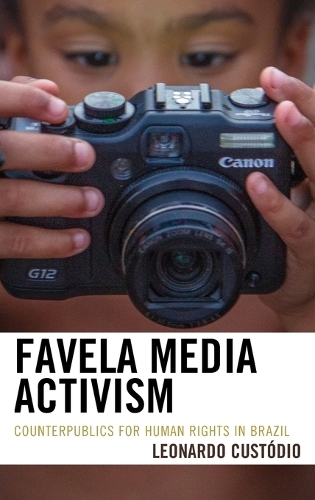
Favela Media Activism: Counterpublics for Human Rights in Brazil
(Hardback)
Publishing Details
Favela Media Activism: Counterpublics for Human Rights in Brazil
By (Author) Leonardo Custdio
Bloomsbury Publishing PLC
Lexington Books
24th July 2017
United States
Classifications
Professional and Scholarly
Non Fiction
323.042083098153
Physical Properties
Hardback
236
Width 161mm, Height 236mm, Spine 24mm
549g
Description
What explains the engagement of low-income young people in media initiatives for political mobilization and social change in everyday life Favela Media Activism: Counterpublics for Human Rights in Brazil responds to this question using an in-depth ethnographic and interdisciplinary study about the trajectories in media activism among young residents of low-income and violence-ridden favelas in socially unequal Rio de Janeiro. Leonardo Custdio provides multifaceted analyses of how favela youth engage in individual and collective media activist initiatives despite social class constraints and neoliberal imperatives in their everyday life. This book details processes experienced by young favela residents while becoming individuals who act to challenge and change patterns of discrimination, governmental neglect and drug-related violence. It is an important resource for scholars interested in the nuances of political engagement among marginalized youth in todays world of hyper-connectivity, information abundance, and the persistence of racial and social inequalities.
Reviews
This book is a refreshinglyoriginal contribution to our understanding of communication forsocial change.Ithighlightsthe complex relationships between context and communication, theory and practice, the challenges faced by favela media activism informed byacute observations ofstructures, the nature of marginality, the exercise of dominance, and thepower and creativity of counterpublics tocreatecommunication environments of their choice. -- Pradip Ninan Thomas, University of Queensland
Leonardo Custdios Favela Media Activism is an in-depth study of media use, everyday life, and political agency. Custdios research embraces the complexities of political action, exploring diverse individual personal histories, mainstream media, on-line and off-line media practices, and media pedagogies. His approach is laudable for the ways it emphasizes the multiplicity and complexity of social processes of change without fragmenting social reality into isolated segments. -- Clemencia Rodrguez, Temple University
Author Bio
Leonardo Custdio is Brazilian postdoctoral fellow at the Institute for Advanced Social Research (IASR) at the University of Tampere, Finland.
